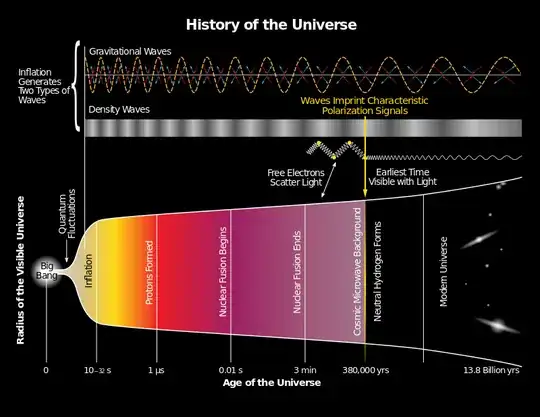Will an unhindered (un-scattered) photon go to the edge of the universe?
3 Answers
There is no edge of the universe.
The standard model for cosmology is based on the FLRW metric. It is what happens when you assume the universe is homogeneous and apply general relativity.
In this model the universe could have a finite volume that's not growing too fast, where paths just loop back on themselves. A photon in such a universe would keep traveling in a straight line but never get too far from where it started. It would never hit some sort of wall.
All the evidence however is consistent with the universe being infinite. Here again there is no edge, not because you loop back to where you started, but because you simply keep traveling further away without encountering any problem.
Taking what I'm saying to 1D rather than 3D, basically we have natural models of the universe that correspond to either a circle or the entire real line. But we do not speak of modeling the universe as a line segment with endpoints.
The answer probably depends on how that question is interpreted. The universe is expanding. The ultimate fate of the universe isn't known for sure, but the growing consensus among cosmologists is that the universe will probably continue to expand forever. If that's the case, then a photon that leaves the Earth now will never catch up to what is currently the edge of the observable universe, so the answer to your question is "no" if you look at the question that way. However, a photon that leaves the Earth now will eventually leave what in the future will be the edge of the observable universe, so the answer to your question is "yes" if you look at the question that way.
However, even if a photon reaches the edge of the observable universe, that doesn't mean that it has reached the edge of the whole universe. We can't know much about what lies beyond the observable universe, but there isn't any evidence that the whole universe has an edge.
- 7,866
Will an unhindered (un-scattered) photon go to the edge of the universe?
To add to the answer of @RedAct : If you are thinking of the three dimensional part of the universe we observe now, it is an instantaneous universe, i.e. time t has one value. In this sense we are at the edge of the expanding universe, the right cutoff at 13.8 billion years in the image below.

Unscattered photons from the beginning of the photon separation at 380000 years from the Big Bang give us the cosmic microwave background radiation, and have reached the edge of the observable universe as defined above. For a complete answer see the answer of RedAct.
- 12,030
- 236,935